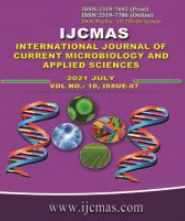


 National Academy of Agricultural Sciences (NAAS)
National Academy of Agricultural Sciences (NAAS)

|
PRINT ISSN : 2319-7692
Online ISSN : 2319-7706 Issues : 12 per year Publisher : Excellent Publishers Email : editorijcmas@gmail.com / submit@ijcmas.com Editor-in-chief: Dr.M.Prakash Index Copernicus ICV 2018: 95.39 NAAS RATING 2020: 5.38 |
Escherichia coli is one of the leading causes of invasive bloodstream infections (BSIs) caused by Gram-negative bacteria throughout the world. Hence, the present study is designed to determine the E. Coli positivity and sensitivity in Invasive bloodstream infections using automated Bactec systems. All the blood culture samples received in the Department of Microbiology for culture by BactecBdfx from July 2015 to June2016 were included in the study. The blood culture was observed in the BactecBdfx system for at least 5 days before they are reported as sterile. Among the total 1275 cultures which were positive for bacteria, 931(73.02%) were positive for Gram-negative bacteria. Among the total of 931culture which were positive for gram-negative bacteria, E.coli was isolated in 266 (28.57%) cultures. Maximum E. coli isolates were found in the age group of 0-1 years (33.83%) followed by 19-45 years (23.68%). Out of total isolates,50(100%) were sensitive to Colistin followed by Piperacillin/Tazobactam45(90.00%), Cotrimoxazole104(66.24%), Doxycycline 167(62.55%), Amikacin 160(60.15%), Cefepime 33(55.00%), Ampicillin 133(50.00%) and Ciprofloxacin 133(50.00%). Among the total isolates, E.Coli was resistant to Levofloxacin, 51(87.93%) followed by Cefazolin 43(78.18%), Cefotaxime/Clavulanic acid 17(77.27%), Amoxiclav 83(65.87%), Gentamycin 133 (50.38%), and Ampicillin 133(50.00%). E.Coli is one of the most common organisms among Gram-Negative isolates and the most commonest isolated in the neonate and infant age group. All the E.coli isolates showed maximum sensitivity to Colistin, Piperacillin/Tazobactam, Cotrimoxazole, and Doxycycline while it showed high-level resistance to Levofloxacin followed by Cefazolin, Cefotaxime/Clavulanic acid, Amoxiclavulanic acid, and Gentamycin.
 |
 |
 |
 |
 |